| Listing 1 - 8 of 8 |
Sort by
|
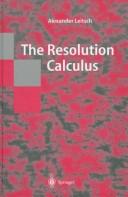
ISBN: 3540618821 Year: 1997 Publisher: Berlin : Springer,
Abstract | Keywords | Export | Availability | Bookmark
 Loading...
Loading...Choose an application
- Reference Manager
- EndNote
- RefWorks (Direct export to RefWorks)
Book
ISBN: 1283086670 9786613086679 9400703201 Year: 2011 Publisher: Dordrecht : Springer,
Abstract | Keywords | Export | Availability | Bookmark
 Loading...
Loading...Choose an application
- Reference Manager
- EndNote
- RefWorks (Direct export to RefWorks)
This book on methods of cut-elimination contains a thorough and rigorous analysis of reductive cut-elimination methods and an in-depth presentation of the recent method CERES developed by the authors. It includes a detailed complexity analysis and comparison of CERES and of reductive methods. It presents several applications of CERES—to interpolation, fast cut-elimination, generalization of proofs and to the analysis of mathematical proofs. Finally, it provides an extension of CERES to non-classical logics, in particular to finitely-valued logics and to Gödel logic.
First-order logic. --- Proof theory. --- Logic, Symbolic and mathematical --- Logic, Modern --- Logic, Symbolic and mathematical. --- Computer science. --- Mathematical Logic and Foundations. --- Mathematical Logic and Formal Languages. --- Informatics --- Science --- Algebra of logic --- Logic, Universal --- Mathematical logic --- Symbolic and mathematical logic --- Symbolic logic --- Mathematics --- Algebra, Abstract --- Metamathematics --- Set theory --- Syllogism --- Mathematical logic.
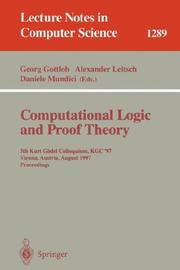
ISBN: 3540571841 0387571841 3540479430 Year: 1993 Volume: 713 Publisher: Berlin : Springer-Verlag,
Abstract | Keywords | Export | Availability | Bookmark
 Loading...
Loading...Choose an application
- Reference Manager
- EndNote
- RefWorks (Direct export to RefWorks)
The Third Kurt G|del Symposium, KGC'93, held in Brno, Czech Republic, August1993, is the third in a series of biennial symposia on logic, theoretical computer science, and philosophy of mathematics. The aim of this meeting wasto bring together researchers working in the fields of computational logic and proof theory. While proof theory traditionally is a discipline of mathematical logic, the central activity in computational logic can be foundin computer science. In both disciplines methods were invented which arecrucial to one another. This volume contains the proceedings of the symposium. It contains contributions by 36 authors from 10 different countries. In addition to 10 invited papers there are 26 contributed papers selected from over 50 submissions.
Automatic theorem proving --- Logic, Symbolic and mathematical --- Congresses. --- Logic programming --- Congresses --- Proof theory --- Logic, Symbolic and mathematical. --- Logic design. --- Science --- Computer science. --- Artificial intelligence. --- Mathematical Logic and Foundations. --- Logics and Meanings of Programs. --- Philosophy of Science. --- Mathematical Logic and Formal Languages. --- Artificial Intelligence. --- Philosophy. --- AI (Artificial intelligence) --- Artificial thinking --- Electronic brains --- Intellectronics --- Intelligence, Artificial --- Intelligent machines --- Machine intelligence --- Thinking, Artificial --- Bionics --- Cognitive science --- Digital computer simulation --- Electronic data processing --- Logic machines --- Machine theory --- Self-organizing systems --- Simulation methods --- Fifth generation computers --- Neural computers --- Informatics --- Normal science --- Philosophy of science --- Design, Logic --- Design of logic systems --- Digital electronics --- Electronic circuit design --- Logic circuits --- Switching theory --- Algebra of logic --- Logic, Universal --- Mathematical logic --- Symbolic and mathematical logic --- Symbolic logic --- Mathematics --- Algebra, Abstract --- Metamathematics --- Set theory --- Syllogism
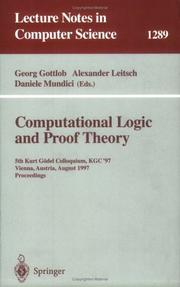
ISBN: 3540633855 354069806X 9783540633853 Year: 1997 Volume: 1289 Publisher: Berlin [etc.] : Springer-Verlag,
Abstract | Keywords | Export | Availability | Bookmark
 Loading...
Loading...Choose an application
- Reference Manager
- EndNote
- RefWorks (Direct export to RefWorks)
This book constitutes the refereed proceedings of the 5th Kurt Gödel Colloquium on Computational Logic and Proof Theory, KGC '97, held in Vienna, Austria, in August 1997. The volume presents 20 revised full papers selected from 38 submitted papers. Also included are seven invited contributions by leading experts in the area. The book documents interdisciplinary work done in the area of computer science and mathematical logics by combining research on provability, analysis of proofs, proof search, and complexity.
Automatic theorem proving --- Logic, Symbolic and mathematical --- Congresses. --- Computer Science --- Engineering & Applied Sciences --- Congresses --- Mathematics. --- Programming languages (Electronic computers). --- Algorithms. --- Mathematical logic. --- Artificial intelligence. --- Mathematical Logic and Foundations. --- Programming Languages, Compilers, Interpreters. --- Artificial Intelligence (incl. Robotics). --- Mathematical Logic and Formal Languages. --- Algorithm Analysis and Problem Complexity. --- AI (Artificial intelligence) --- Artificial thinking --- Electronic brains --- Intellectronics --- Intelligence, Artificial --- Intelligent machines --- Machine intelligence --- Thinking, Artificial --- Bionics --- Cognitive science --- Digital computer simulation --- Electronic data processing --- Logic machines --- Machine theory --- Self-organizing systems --- Simulation methods --- Fifth generation computers --- Neural computers --- Algebra of logic --- Logic, Universal --- Mathematical logic --- Symbolic and mathematical logic --- Symbolic logic --- Mathematics --- Algebra, Abstract --- Metamathematics --- Set theory --- Syllogism --- Algorism --- Algebra --- Arithmetic --- Computer languages --- Computer program languages --- Computer programming languages --- Machine language --- Languages, Artificial --- Math --- Science --- Foundations --- Logic [Symbolic and mathematical ] --- Logic, Symbolic and mathematical. --- Computer science. --- Computer software. --- Artificial Intelligence. --- Software, Computer --- Computer systems --- Informatics --- Automatic theorem proving - Congresses. --- Logic, Symbolic and mathematical - Congresses
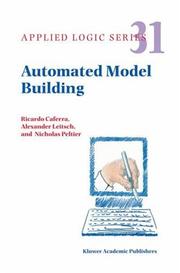
ISBN: 1402026528 9781402026522 1402026536 9781402026539 9789048166961 Year: 2004 Publisher: Dordrecht London Kluwer Academic
Abstract | Keywords | Export | Availability | Bookmark
 Loading...
Loading...Choose an application
- Reference Manager
- EndNote
- RefWorks (Direct export to RefWorks)
On the history of the book: In the early 1990s several new methods and perspectives in au- mated deduction emerged. We just mention the superposition calculus, meta-term inference and schematization, deductive decision procedures, and automated model building. It was this last ?eld which brought the authors of this book together. In 1994 they met at the Conference on Automated Deduction (CADE-12) in Nancy and agreed upon the general point of view, that semantics and, in particular, construction of models should play a central role in the ?eld of automated deduction. In the following years the deduction groups of the laboratory LEIBNIZ at IMAG Grenoble and the University of Technology in Vienna organized several bilateral projects promoting this topic. This book emerged as a main result of this cooperation. The authors are aware of the fact, that the book does not cover all relevant methods of automated model building (also called model construction or model generation); instead the book focuses on deduction-based symbolic methods for the construction of Herbrand models developed in the last 12 years. Other methods of automated model building, in particular also ?nite model building, are mainly treated in the ?nal chapter; this chapter is less formal and detailed but gives a broader view on the topic and a comparison of di?erent approaches. Howtoreadthisbook: In the introduction we give an overview of automated deduction in a historical context, taking into account its relationship with the human views on formal and informal proofs.
Automatic theorem proving --- Applied logic --- Automated theorem proving --- Theorem proving, Automated --- Theorem proving, Automatic --- Artificial intelligence --- Proof theory --- Logic. --- Mathematical logic. --- Mathematical Logic and Foundations. --- Algebra of logic --- Logic, Universal --- Mathematical logic --- Symbolic and mathematical logic --- Symbolic logic --- Mathematics --- Algebra, Abstract --- Metamathematics --- Set theory --- Syllogism --- Argumentation --- Deduction (Logic) --- Deductive logic --- Dialectic (Logic) --- Logic, Deductive --- Intellect --- Philosophy --- Psychology --- Science --- Reasoning --- Thought and thinking --- Methodology
Book
ISBN: 9789400703209 Year: 2011 Publisher: Dordrecht Springer Netherlands
Abstract | Keywords | Export | Availability | Bookmark
 Loading...
Loading...Choose an application
- Reference Manager
- EndNote
- RefWorks (Direct export to RefWorks)
This book on methods of cut-elimination contains a thorough and rigorous analysis of reductive cut-elimination methods and an in-depth presentation of the recent method CERES developed by the authors. It includes a detailed complexity analysis and comparison of CERES and of reductive methods. It presents several applications of CERES to interpolation, fast cut-elimination, generalization of proofs and to the analysis of mathematical proofs. Finally, it provides an extension of CERES to non-classical logics, in particular to finitely-valued logics and to Gödel logic.
Multi
ISBN: 9789400703209 Year: 2011 Publisher: Dordrecht Springer Netherlands
Abstract | Keywords | Export | Availability | Bookmark
 Loading...
Loading...Choose an application
- Reference Manager
- EndNote
- RefWorks (Direct export to RefWorks)
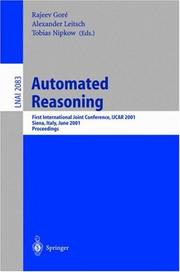
ISBN: 3540422544 3540457445 9783540422549 Year: 2001 Volume: 2083 Publisher: Berlin, Heidelberg : Springer Berlin Heidelberg : Imprint: Springer,
Abstract | Keywords | Export | Availability | Bookmark
 Loading...
Loading...Choose an application
- Reference Manager
- EndNote
- RefWorks (Direct export to RefWorks)
Automatic theorem proving --- Computer logic --- Computer Science --- Engineering & Applied Sciences --- Artificial intelligence. --- Logic design. --- Design, Logic --- Design of logic systems --- AI (Artificial intelligence) --- Artificial thinking --- Electronic brains --- Intellectronics --- Intelligence, Artificial --- Intelligent machines --- Machine intelligence --- Thinking, Artificial --- Computer science. --- Software engineering. --- Computer logic. --- Mathematical logic. --- Computer Science. --- Artificial Intelligence (incl. Robotics). --- Mathematical Logic and Formal Languages. --- Logics and Meanings of Programs. --- Software Engineering. --- Mathematical Logic and Foundations. --- Bionics --- Cognitive science --- Digital computer simulation --- Electronic data processing --- Logic machines --- Machine theory --- Self-organizing systems --- Simulation methods --- Fifth generation computers --- Neural computers --- Algebra of logic --- Logic, Universal --- Mathematical logic --- Symbolic and mathematical logic --- Symbolic logic --- Mathematics --- Algebra, Abstract --- Metamathematics --- Set theory --- Syllogism --- Computer science logic --- Logic, Symbolic and mathematical --- Computer software engineering --- Engineering --- Informatics --- Science --- Digital electronics --- Electronic circuit design --- Logic circuits --- Switching theory --- Logic, Symbolic and mathematical. --- Artificial Intelligence. --- Congresses --- Automatic theorem proving - Congresses --- Computer logic - Congresses
| Listing 1 - 8 of 8 |
Sort by
|

 Search
Search Feedback
Feedback About UniCat
About UniCat  Help
Help News
News